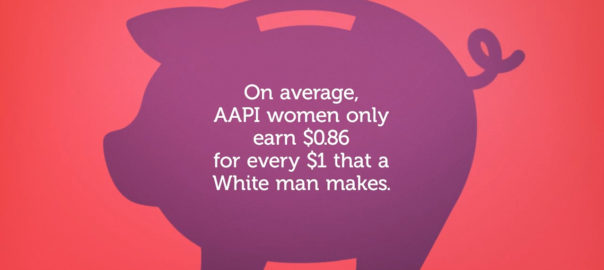By Guest Contributor: Sung Yeon Choimorrow (Executive Director, NAPAWF)
The gender pay gap is the difference between what men and women earn for doing the same work, and it varies for different sub-groups of women. In 2019, Asian American Pacific Islander (AAPI) women earned 90 cents for every dollar that white, non-Hispanic men made. Today marks the symbolic day in 2020 when we “catch up” to white men’s earnings from the previous year. The wage gap exists in every state and every occupation, regardless of education—but there’s so much more to the story hidden by the averages.
The term AAPI includes more than 50 ethnic subgroups, some of which experience much wider pay gaps. Vietnamese American women, for example, made 67 cents for every dollar white men made last year and Cambodian American women made 57 cents. These women will have to work for several more months for their paychecks to catch up while the lost wages compound.
Asian Americans have long been depicted as “model minorities” in this country. It’s a persistent myth that all Asians are the same and we’re all high-achieving with stable incomes. By failing to recognize our lived experiences, the myth makes it easier to dismiss our struggles and reinforces the misconception that Asian people don’t need resources or support.
The experiences of millions of AAPI women show that this isn’t the case. Kongdeaune fled political persecution in Laos with her husband and children in 1981. When she arrived in Rhode Island, she began working at a factory where she was paid the same minimum wage for the next 35 years of her life. She worked many 16-hour days to be able to support her children and send some money back to family in Laos — and she did all of this without paid sick leave or vacation.
AAPI women are overrepresented in the most poorly paid jobs in the country. And not being paid an equal wage falls hardest on those who are making less or struggling to afford necessities like putting food on the table or getting to the doctor.
The reality is that AAPI women are overrepresented in the most poorly paid jobs in the country. And not being paid an equal wage falls hardest on those who are making less or struggling to afford necessities like putting food on the table or getting to the doctor. Already, immigrants in this country face significant barriers to getting health care. Current law requires immigrants to wait five years after obtaining lawful permanent resident, or green card status, before they are eligible for Medicaid, the Children’s Health Insurance Program, or Medicare. Undocumented immigrants are barred completely from these programs and from buying insurance from the ACA marketplace. As a result, immigrants have to navigate a patchwork of available care, paying out of pocket when they can.
Being paid less than you deserve only makes those challenges harder. The wage gap is even wider for AAPI women who are mothers like Kongdeaune, who typically make 86 cents, working full-time and year-round, for every dollar paid to white fathers. In the United States, mothers are breadwinners in half of families with children under 18. The consequences of the wage gap are real for women, their families, and their communities.
While the wage gap has narrowed over the last few decades, an Asian American woman starting her career today still stands to lose $240,280 to the wage gap over a 40-year career. What could she do with that money?
There are tools that could help us solve the problem of equal pay. The House already voted to approve the Paycheck Fairness Act, while the Senate has failed to Act. This bill would provide women with necessary protections against pay discrimination. But we should also do more based on what we already know about the struggles AAPI women, especially immigrants, face. We should pass the HEAL Act to ensure immigrants can get health insurance without delay, because no one should be forced to go without care because of their immigration status or the size of their paycheck.
We have more work to do before every single person, regardless of their gender, race, socioeconomic class, or immigration status, has what they need to thrive. On a day when we acknowledge this long-standing inequality, we must also recognize the range in the way AAPI women experience it and the urgency of not leaving anyone behind.
Sung Yeon is a first generation immigrant working mom and serves as Executive Director of NAPAWF. She came to NAPAWF as their National Field Director to build a base of community leaders most affected by NAPAWF’s policy areas: immigrant rights, economic justice, and reproductive health and now oversees the organizing team.
Previously, Sung Yeon was the Director of Organizing at Interfaith Worker Justice to lead unions and faith communities on worker justice and a Community Organizer at the Asian American Institute in Chicago working on elections and immigration reform. Born in South Korea, Sung Yeon immigrated to the U.S. for her degree from Wheaton College in Political Science and Urban Studies, and later, an M. Div from McCormick Theological Seminary. She is an Ordained Minister in the Presbyterian Church. Sung Yeon is also a board member of the Hana Center where to works with Korean American immigrants in Chicago.
Learn more about Reappropriate’s guest writing program and submit your work here.

